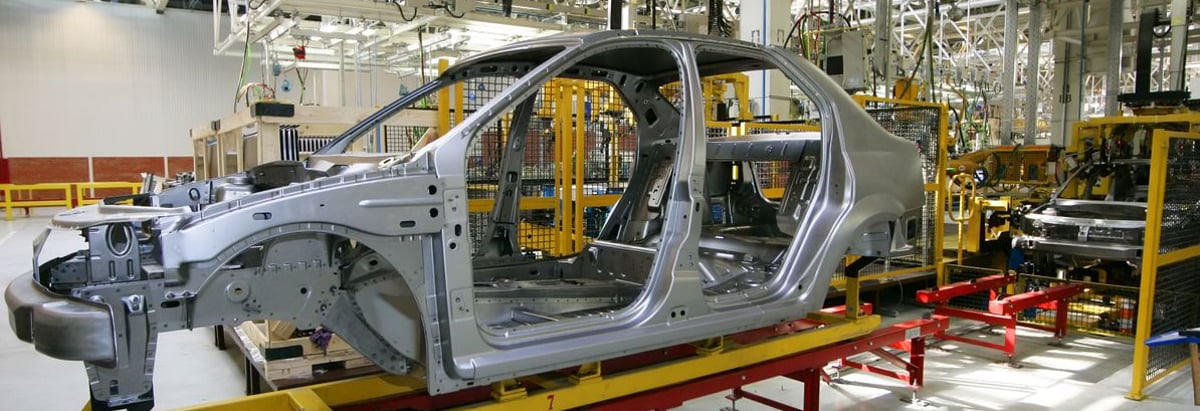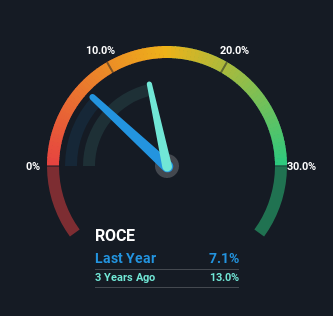Maruti Suzuki India (NSE:MARUTI) Will Be Hoping To Turn Its Returns On Capital Around

What trends should we look for it we want to identify stocks that can multiply in value over the long term? In a perfect world, we'd like to see a company investing more capital into its business and ideally the returns earned from that capital are also increasing. If you see this, it typically means it's a company with a great business model and plenty of profitable reinvestment opportunities. Having said that, from a first glance at Maruti Suzuki India (NSE:MARUTI) we aren't jumping out of our chairs at how returns are trending, but let's have a deeper look.
What Is Return On Capital Employed (ROCE)?
If you haven't worked with ROCE before, it measures the 'return' (pre-tax profit) a company generates from capital employed in its business. To calculate this metric for Maruti Suzuki India, this is the formula:
Return on Capital Employed = Earnings Before Interest and Tax (EBIT) ÷ (Total Assets - Current Liabilities)
0.071 = ₹41b ÷ (₹747b - ₹170b) (Based on the trailing twelve months to June 2022).
So, Maruti Suzuki India has an ROCE of 7.1%. In absolute terms, that's a low return and it also under-performs the Auto industry average of 18%.
Our analysis indicates that MARUTI is potentially overvalued!

Above you can see how the current ROCE for Maruti Suzuki India compares to its prior returns on capital, but there's only so much you can tell from the past. If you'd like, you can check out the forecasts from the analysts covering Maruti Suzuki India here for free.
What Does the ROCE Trend For Maruti Suzuki India Tell Us?
In terms of Maruti Suzuki India's historical ROCE movements, the trend isn't fantastic. Over the last five years, returns on capital have decreased to 7.1% from 21% five years ago. Although, given both revenue and the amount of assets employed in the business have increased, it could suggest the company is investing in growth, and the extra capital has led to a short-term reduction in ROCE. And if the increased capital generates additional returns, the business, and thus shareholders, will benefit in the long run.
The Key Takeaway
While returns have fallen for Maruti Suzuki India in recent times, we're encouraged to see that sales are growing and that the business is reinvesting in its operations. These trends don't appear to have influenced returns though, because the total return from the stock has been mostly flat over the last five years. So we think it'd be worthwhile to look further into this stock given the trends look encouraging.
One final note, you should learn about the 2 warning signs we've spotted with Maruti Suzuki India (including 1 which is concerning) .
If you want to search for solid companies with great earnings, check out this free list of companies with good balance sheets and impressive returns on equity.
New: Manage All Your Stock Portfolios in One Place
We've created the ultimate portfolio companion for stock investors, and it's free.
• Connect an unlimited number of Portfolios and see your total in one currency
• Be alerted to new Warning Signs or Risks via email or mobile
• Track the Fair Value of your stocks
Have feedback on this article? Concerned about the content? Get in touch with us directly. Alternatively, email editorial-team (at) simplywallst.com.
This article by Simply Wall St is general in nature. We provide commentary based on historical data and analyst forecasts only using an unbiased methodology and our articles are not intended to be financial advice. It does not constitute a recommendation to buy or sell any stock, and does not take account of your objectives, or your financial situation. We aim to bring you long-term focused analysis driven by fundamental data. Note that our analysis may not factor in the latest price-sensitive company announcements or qualitative material. Simply Wall St has no position in any stocks mentioned.
About NSEI:MARUTI
Maruti Suzuki India
Engages in the manufacture, purchase, and sale of motor vehicles, components, and spare parts primarily in India.
Excellent balance sheet average dividend payer.


